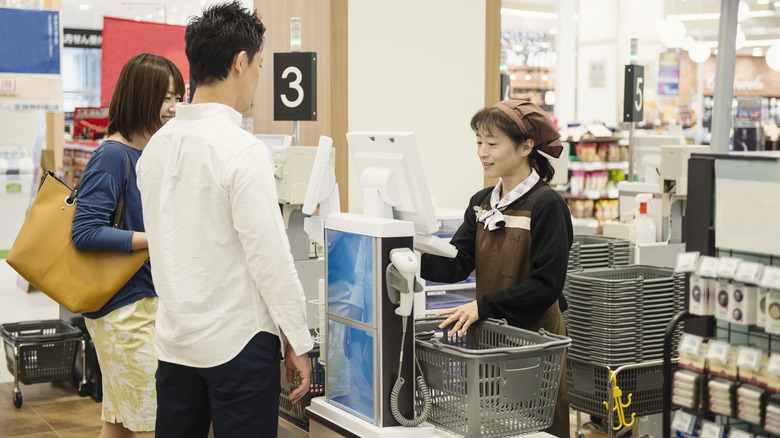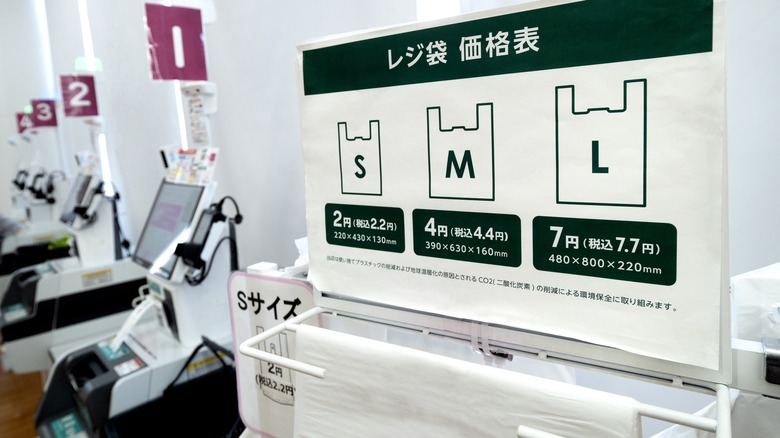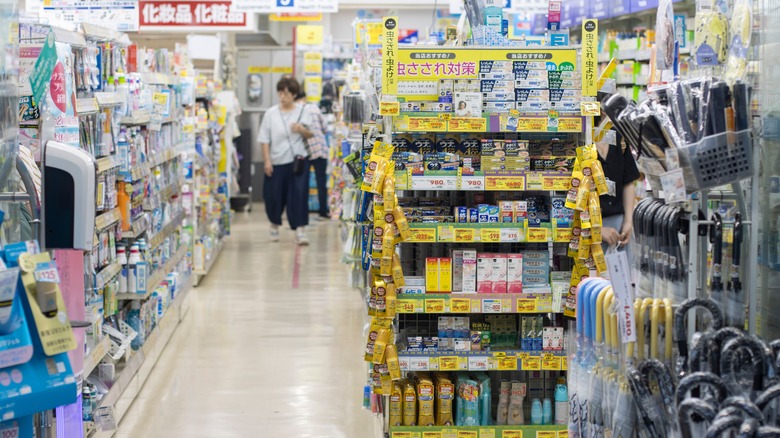The One Crucial Word Tourists Need To Know While Checking Out At A Store In Japan
When you've arrived in Japan and are ready to go shopping, it can be disorienting trying to make sense of all the Japanese-language signs and packages in the store. Fortunately, this easy iPhone hack translates restaurant menus, signs, and packages, allowing you to point your camera at Japanese text and see what it says in English. You can also use an app like Google Translate to achieve the same aim on the spot.
Some supermarkets and convenience stores also have self-checkout or "semi-self-checkout" registers with an English-language option on their touchscreens. Technology like this makes it possible to enter and exit the store sometimes with little to no human interaction. However, in drugstores, department stores, and elsewhere, you still might find yourself in a situation where you need to communicate with a cashier in the checkout lane.
It helps to know some Japanese vocabulary when dealing with an actual person, particularly one who is asking you a question you might not understand. Saying "Konnichiwa" and "Arigato" ("Hello" and "Thank you") is all well and good for a tourist, but what happens when they ask you something trickier and you don't know how to respond? This often occurs when it comes to the simple matter of determining whether you need a plastic shopping bag to tote what you've bought out of the store. To overcome the language barrier in that situation, an important word to know is "fukuro," which just means "bag." Consider this your Japanese word of the day.
'Fukuro' is your cue to request or refuse a shopping bag
In mid-2020 — to help reduce plastic waste — the Japanese government required stores to start charging customers a few yen (the equivalent of U.S. pennies) per shopping bag. This upended part of the usual checkout process, and it could lead to a moment of confusion if you don't know how to ask for a bag or don't know what the cashier is saying when they offer one (which they don't always do). It's something that could even catch travelers who have visited Japan before by surprise if they haven't been here since before the pandemic.
If you don't ask for a bag now, the cashier might assume you have your own tucked away somewhere or that you're planning to carry your purchase out the door with your bare hands. They won't automatically give you one, but even if you just make a bag gesture and say "fukuro," they should be able to understand what you want. The flip side is when they offer a bag, but you want to refuse it. When you hear "fukuro," you can cross your arms in an "X," meaning "No."
You might also hear some variations on the word "fukuro," which changes to "bukuro" when it has another word in front of it. "Reji bukuro" means "register bag," while "bineeru bukuro" means "vinyl bag." Both phrases essentially signify the same thing, with the added prefixes being English loan words transformed through Japanese pronunciation.
Other useful words to know when shopping
Before you checkout, you first must locate what you're buying, which is sometimes harder than it sounds. Let's say you want a pair of earplugs ("mimisen") so you can sleep on the plane or bullet train, but you have no idea where to begin looking for them in a big Japanese drugstore. If you find a clerk and ask, "Mimisen wa arimasu ka?" that just means, "Do you have earplugs?"
The same simple sentence pattern works when you substitute other words, like "kazegusuri" (cold medicine). In that case, you would ask, "Kazegusuri wa arimasu ka?" Chalk it up to the famous Japanese spirit of hospitality, but in my experience, the clerks are usually so helpful that they will guide you to the exact aisle and shelf with your item on it.
When you get to the checkout, just be sure not to thrust your money directly at the cashier, as this common way to handle money is seen as unusual in Japan. In some cases, before you get to the bagging stage, you might see them put another ceremonial layer of plastic wrap around each individual package you're buying. This arguably contributes to plastic waste even more than bags. If you say, "Sono mama," that will let them know that you just want the packages the way they are, without all the excess plastic wrap. Elsewhere, tourists looking for a hotel in Japan should prioritize ones listed with this word.


